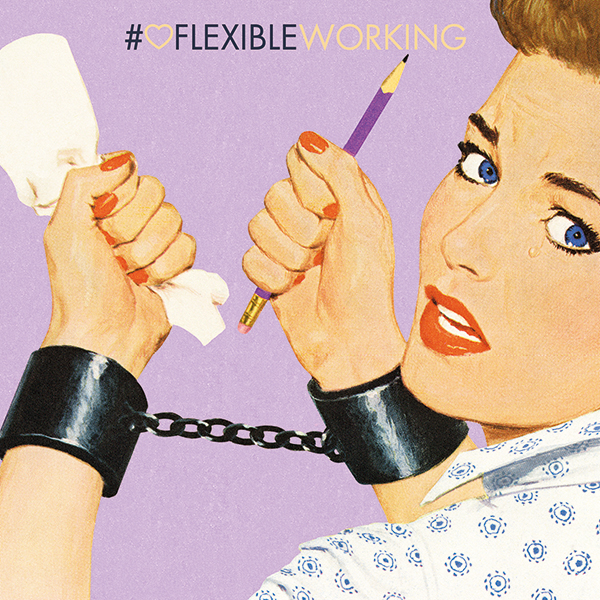
As the only publication for Women in Business in Europe, our Steering Committee spent many months wrestling with the dilemma of the subject for our first campaign, only to realise that there really was only one subject – that of Flexible Working.
There are numerous differences between men and women but the one immovable difference is that men cannot give birth. This falls to women and as if that were not enough of a challenge, many women then have the terrible dilemma of how return to work. Without women giving birth, the world would eventually grind to a halt so they are performing one of the most vital endeavours humans can undertake.
Why, oh why, do we then penalise her and make it so bloody tough for her to return to work? This is not always the case but l have heard this time and time again. Bad enough she has been through a life changing event and has quadrupled her responsibilities and her work load but now she is faced with trying to re-enter the work place when her colleagues have surged ahead, new clients won, old projects completed and new ones underway. This is probably one of the most daunting things she can face - if we ignore the eight pounder she has recently pushed out of her body!
73% - of business report that it improves staff motivation
Not only assaulted by a lack of confidence, insecurity over where the job is going and her ability to resume her career, and constant concern over expressing milk, getting her head back ‘into the game’, getting home for bedtime and the myriad of other concerns, but now she needs to click back into superwomen mode at work. I genuinely don’t know how you do it! Many a man would fall at the first hurdle and freak out would arrive on an hourly basis.
The childcare situation in the UK is appalling to say the least. There are many allowances and benefits of course, but a quick look tells us that the ‘average’ weekly salary in the UK is £569pw and the ‘average’ childminder charges £221pw, Nursery £242pw and live-in nanny £550pw. There’s the first problem, many women simply cannot afford to go back to work and those that do, to stop from going bonkers singing Peppa Pig songs all day, effectively work for nothing.
One might wonder if the predominantly male-led businesses in this country have lost their collective minds. What a valuable asset they are paying lip service too. In 2018, there were 33.65m females and 32.79m males in the UK, therefore many male bosses are making it tough for the majority of the working population to return to work.
As pointed out in the recent Rose Review, authored by the new NatWest CEO Alison Rose (watch out for our exclusive interview in the next issue) if women opened businesses at the same rate as men, it would be worth over £250 billion to the UK economy!!
And there’s the next area of pressure on women – many feel the only way to achieve their work/life balance is to start their own business, where they can set their own hours. Great, if this is what they want to do but what of those that are forced into this decision after weighting the options?
Dynamic thinks it is time for major change to maximise the incredible value that women bring to the world of work. See our manifesto overleaf.
Every employee in the UK has the statutory right to request flexible working after 26 weeks of employment but we all know bosses who find ways around agreeing to this and, with many, it has become an art form.
From our perspective, at The Platinum Group, we adopted this approach over five years ago and the results have been staggering. Utilising the company run by Emma Cleary, now called Flexibility Matters, we decided to only employ mothers who were returning to work. A risk we were told in no uncertain terms as little Johnny would be ill half the time, holidays and half term would be a nightmare and every time little Johnny got the sniffles, she would be out of the door. What utter tosh.
Three quarters of the Dynamic Team are now such women and they are the hardest working, most proficient, most productive team members we have and l am not sure we could run the company without them.
I have four sisters and four daughters, was raised in an all-female household and attended a school with 128 girls and 5 boys and l have absolutely no understanding of this gender issue, as l simply do not see it as an issue. We are all 100% equal – end of. In fact, l see women as more able in far more jobs than men. I say to my daughters that they are not equal to men and they would verbally attack with such gusto that it warms my heart.
With the next generation of girls coming through, l fervently hope that one day there will be no need for this magazine and l for one will be delighted to announce cessation of publication but until then, we must fight for change – not next year or in the next decade but NOW.
Our manifesto
1 All companies with more than 800 staff should be bound by law, and common sense, to create a crèche/nursery in the workplace.
2 All pre-school nursery places should be free of charge in recognition that they are the incubators of the next generation of wealth creators.
3 All fathers should have a mandatory three-month paternity leave to allow them to fully understand the burden placed on mothers.
4 Launch an innovative new investment vehicle to increase funding going to female entrepreneurs.
5 All companies should offer sensible flexible working arrangements for all staff, therefore judging workers by what they do and not the hours they work.
6 Every company with more than 500 employees should, by law, have a female board member tasked with the legal provision of all the above. This should be for ALL staff and not just women.
Few would argue against the fact that flexible working is desirable, but it is still out of reach for millions of employees. A recent TUC poll found that flexi-time is unavailable to 58% of the UK workforce. This is unacceptable.
Within our campaigning section of the magazine, we outline why flexible working is so important. Over the following pages, members of our steering committee spell out why flexible working matters. This is followed by a case study of creative agency Something Big, which offers practical advice on how to implement flexible working.
Emma Cleary explains why she started a recruitment agency that focuses solely on positions that promote flexible hours.
And finally we present the Dynamic Manifesto – a call to action on how businesses and the Government must act to encourage flexible working, ensure there are more female board members and remove the burden of prohibitive childcare. It is time to act!
Julie Kapsalis
CEO Chichester / Crawley College Group
How has flexible working helped you?
As a busy working mother of two boys (aged 7 and 8) flexible working isn’t just about a change/reduction in hours or working from home. It’s about the culture and ethos of an organisation. For me, flexible working is knowing that I can be 30 minutes late into the office to be able to take my children into school on their first day of term.
It’s about being able to finish a little bit early to watch a rugby game or go to a meeting at the school. I hugely value the flexibility that my employer gives me and it gives me both sanity and loyalty. My job entails a lot of out of hours work and flexibility works both ways – a flexible approach to working drives greater productivity and job satisfaction.
I am keen to extend this flexibility to the culture of a number of Boards that I sit on. I believe that Boards need to understand that a commitment to greater diversity includes a commitment to exploring more flexible approaches to meetings through uses of technology and revisiting timings of meetings.”
Alison Jones
Partner, Kreston Reeves
Is Flexible working right for all staff?
We took the decision to bring in agile working across the whole firm in November 2018 and one of our initial main concerns was whether this is suitable for all staff?
Our policy relies on trust and ensuring that it works for everyone, including the other members of the team, and especially our clients. We always put our clients’ needs first and so it is important that there is strong communication with the rest of the team and clarity over calendar and availability.
Managing your team is more complicated but luckily, we have a telephone system similar to Skype that allows us to connect to each other and IT that allows us to log onto our central systems from anywhere.
The team continue to work together in the office most of the time because they enjoy working together but being able to work from home sometimes or flex their hours has proved invaluable and helped us all achieve a better work life balance.
It has been an outstanding success.
Louise Punter
CEO Surrey Chambers of Commerce
Do businesses need to offer flexible working to attract the best staff?
By offering flexible working a business is immediately able to select from a much bigger pool of people, maximising their chance of finding the best new employee. There can be many reasons why someone needs this flexibility.
An obvious reason could be women, and in some cases men, returning to work after staying home with children and needing to adjust their hours to accommodate some childcare responsibilities. Many people have other caring responsibilities involving elderly parents or sometimes it may relate to a specific hobby or passion requiring occasional different hours. Whatever the need there is no doubt that if this flexibility can be accommodated it will attract more people and once on board they will be much happier and valued employees and therefore deliver better results.
So the answer is unreservedly “Yes”!
Victoria Kerton
Regional Director NatWest
What has been your experience of flexible working?
When I started a family in the mid-2000s, flexible working was not widely offered, and so I had to work out what my priorities were. My husband and I made the decisions together, and I requested to work reduced hours and some of those remotely, which at that time became a possibility through changes in technology.
The cultural tone was different then, and the level of encouragement for flexible working varied from employer to employer – it was very reliant on how supportive the senior management was. I was lucky that at that time my employer was keen to make it work, which I really appreciated. A lot of the support I received was down to my managing director, who advocated for me and took a risk in bringing me back part-time, as it really was a risk then.
Very positively, and certainly within NatWest, flexible working today is not seen as an impediment to growth. The bank has a tremendous awareness of the value it can create and retain, and I am very proud to work for an organisation that holds those views. In my experience, flexibility and an understanding of individual needs can, in fact, lead to a more productive, creative and loyal workplace.





